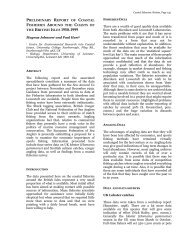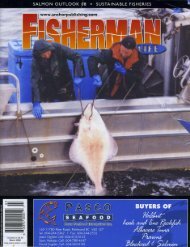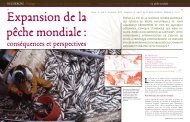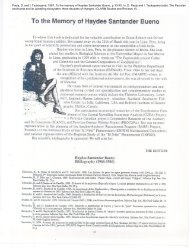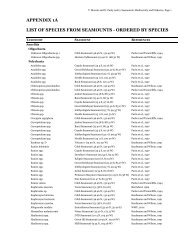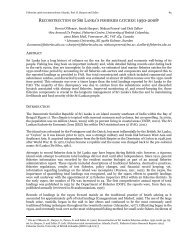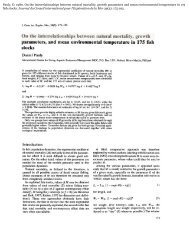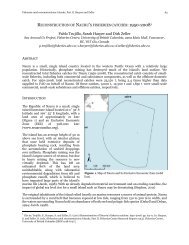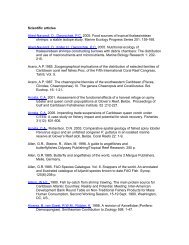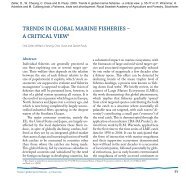Total marine fisheries extractions by country in the Baltic Sea
Total marine fisheries extractions by country in the Baltic Sea
Total marine fisheries extractions by country in the Baltic Sea
Create successful ePaper yourself
Turn your PDF publications into a flip-book with our unique Google optimized e-Paper software.
<strong>Total</strong> <strong>mar<strong>in</strong>e</strong> <strong>fisheries</strong> <strong>extractions</strong> <strong>by</strong> <strong>country</strong> <strong>in</strong> <strong>the</strong> <strong>Baltic</strong> <strong>Sea</strong>: 1950-present, Ross<strong>in</strong>g, Booth and Zeller 199<br />
Kal<strong>in</strong><strong>in</strong>grad account<strong>in</strong>g for 90% of <strong>fisheries</strong> catches, and St. Petersburg for 10% (Appendix tables C, D).<br />
Fisheries out of St. Petersburg appear to have decl<strong>in</strong>ed substantially <strong>by</strong> <strong>the</strong> 2000s.<br />
Unreported land<strong>in</strong>gs are a serious concern for <strong>fisheries</strong> worldwide and are considered to be <strong>the</strong> most<br />
significant component of IUU <strong>in</strong> <strong>the</strong> <strong>Baltic</strong> <strong>Sea</strong> (Anon., 2007b). Unreported land<strong>in</strong>gs for Russia were only<br />
considered from <strong>the</strong> early 1990s onward and represented 15% of <strong>the</strong> total reconstructed catch for <strong>the</strong><br />
period 1992-2007. Discards have been identified as a major contributor <strong>in</strong> underestimat<strong>in</strong>g <strong>the</strong> impacts of<br />
global <strong>fisheries</strong> on <strong>the</strong> <strong>mar<strong>in</strong>e</strong> ecosystems (Alverson, 1994). Discarded catches were considered for Russia<br />
throughout <strong>the</strong> entire study period, and represented 4% of <strong>the</strong> total reconstructed catch from 1950-2007.<br />
Both unreported land<strong>in</strong>gs and discards were dom<strong>in</strong>ated <strong>by</strong> herr<strong>in</strong>g and sprat, which were also <strong>the</strong> most<br />
significant <strong>fisheries</strong> <strong>in</strong> Russia throughout <strong>the</strong> study period.<br />
Recreational <strong>fisheries</strong> were a m<strong>in</strong>or contributor to <strong>the</strong> total reconstructed catch; however, our estimates<br />
were very rudimentary for this catch component. Recreational <strong>fisheries</strong> data were lack<strong>in</strong>g for most of <strong>the</strong><br />
time-period considered, with reports only for a few years dur<strong>in</strong>g <strong>the</strong> most recent decade. While <strong>the</strong><br />
magnitude of recreational <strong>fisheries</strong> is likely much less than commercial <strong>fisheries</strong>, improved data collection<br />
is necessary <strong>in</strong> order to build a more complete picture of total <strong>fisheries</strong> catches from <strong>the</strong> <strong>Baltic</strong> <strong>Sea</strong>,<br />
particularly as <strong>the</strong>se two <strong>fisheries</strong> often target different taxa. Recreational <strong>fisheries</strong> <strong>in</strong> Russia were<br />
dom<strong>in</strong>ated <strong>by</strong> cod and ‗o<strong>the</strong>rs‘ while commercial <strong>fisheries</strong> were dom<strong>in</strong>ated <strong>by</strong> herr<strong>in</strong>g and sprat. In order<br />
to improve recreational <strong>fisheries</strong> data, Russia should conduct creel surveys on a regular basis (e.g., every<br />
few years) used to expand to Russia <strong>Baltic</strong> <strong>Sea</strong>-wide catches, and use estimation methods between survey<br />
years.<br />
Illegal, Unreported and Unregulated (IUU) <strong>fisheries</strong> are a problem worldwide, and have also been<br />
identified as a concern <strong>in</strong> <strong>the</strong> <strong>Baltic</strong> <strong>Sea</strong>, but <strong>in</strong>formation on IUU <strong>fisheries</strong> <strong>in</strong> Russia was sparse. A study on<br />
fish<strong>in</strong>g activities <strong>in</strong> Russia‘s Far East estimated IUU to be 20-60% of reported catches for <strong>the</strong> area, and<br />
anecdotal evidence suggests that it might be even higher (Burnett et al., 2008). The same report stated<br />
that a substantial quantity of fish caught <strong>by</strong> Russian vessels <strong>in</strong> <strong>the</strong> Barents <strong>Sea</strong> were landed <strong>in</strong> foreign ports<br />
or transferred to foreign cargo vessels before be<strong>in</strong>g landed and <strong>the</strong>refore unreported (Burnett et al., 2008).<br />
This type of IUU activity that is known to occur <strong>in</strong> <strong>the</strong> Barents <strong>Sea</strong> is likely to occur also <strong>in</strong> o<strong>the</strong>r areas of<br />
Russia. However, we were unable to f<strong>in</strong>d similar accounts of IUU fish<strong>in</strong>g activities for Russia <strong>in</strong> <strong>the</strong> <strong>Baltic</strong><br />
<strong>Sea</strong>. To quantify <strong>the</strong> IUU components considered <strong>in</strong> this study, we had to rely on <strong>Baltic</strong>-wide estimates,<br />
which are likely to be conservative, for IUU components of Russia‘s <strong>Baltic</strong> <strong>Sea</strong> <strong>fisheries</strong>.<br />
Where IUU <strong>fisheries</strong> data for Russia were not available, estimates were made based on assumptions<br />
and/or <strong>Baltic</strong>-wide approximations of unreported (IUU) catch components. ICES, <strong>in</strong> <strong>the</strong>ir stock<br />
assessment work<strong>in</strong>g group reports, presents some <strong>Baltic</strong>-wide estimates of catch components such as<br />
unreported (‗unallocated‘) catches and discards, but do not identify which (or how many) countries have<br />
contributed to <strong>the</strong>se data, even though it is known that only some countries present <strong>the</strong>se components.<br />
ICES ma<strong>in</strong>ta<strong>in</strong>s confidentiality agreements with its members which generally prevents <strong>the</strong> disclosure of<br />
data. This lack of transparency <strong>in</strong> report<strong>in</strong>g <strong>by</strong> ICES means that <strong>the</strong> <strong>Baltic</strong>-wide estimates used here are<br />
likely lower than what could have been determ<strong>in</strong>ed if ICES (and <strong>by</strong> extension, its member states) were<br />
more forthcom<strong>in</strong>g with <strong>the</strong>ir data.<br />
The estimates used for unreported land<strong>in</strong>gs should be considered m<strong>in</strong>imal estimates and are <strong>the</strong>refore<br />
conservative. This is because we used reported amounts of unreported land<strong>in</strong>gs as a ratio to <strong>Baltic</strong>-wide<br />
land<strong>in</strong>gs. Although, corrections were made to <strong>the</strong> <strong>Baltic</strong>-wide land<strong>in</strong>gs for countries which are known to<br />
not report amounts of unreported land<strong>in</strong>gs (e.g., Sweden, Persson, this volume), it is likely that o<strong>the</strong>r<br />
countries do not report <strong>the</strong>se details ei<strong>the</strong>r. Thus, <strong>the</strong> ratio of unreported land<strong>in</strong>gs used would have been<br />
greater if corrections had been made to account for all non-report<strong>in</strong>g countries land<strong>in</strong>gs. As long as we<br />
have not overestimated any IUU catches, <strong>the</strong> assumptions used to generate our estimates are justified<br />
given <strong>the</strong> alternative assumption that non-reported or miss<strong>in</strong>g data are approximated as zero catch (Zeller<br />
and Pauly, 2007).<br />
Russia is <strong>the</strong> only <strong>Baltic</strong> <strong>country</strong> that is not a member of <strong>the</strong> European Union (EU). While Russia is not<br />
bound <strong>by</strong> <strong>the</strong> same EU <strong>fisheries</strong> rules and regulations as <strong>the</strong> o<strong>the</strong>r <strong>Baltic</strong> countries, Russia does have a<br />
<strong>fisheries</strong> agreement with <strong>the</strong> EU that follows similar guid<strong>in</strong>g pr<strong>in</strong>ciples. <strong>Baltic</strong> <strong>fisheries</strong> were regulated<br />
through <strong>the</strong> International <strong>Baltic</strong> <strong>Sea</strong> Fisheries Commission (IBSFC) until 2005 (Anon., 2007b). With all<br />
<strong>the</strong> <strong>Baltic</strong> countries except Russia jo<strong>in</strong><strong>in</strong>g <strong>the</strong> EU, a bilateral agreement between <strong>the</strong> European Union and<br />
<strong>the</strong> Russian Federation on ―co-operation <strong>in</strong> <strong>fisheries</strong> and <strong>the</strong> conservation of <strong>the</strong> liv<strong>in</strong>g <strong>mar<strong>in</strong>e</strong> resources <strong>in</strong>



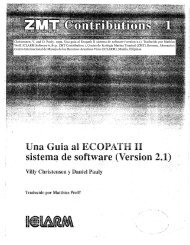

![Nacion.com, San José, Costa Rica [Nacionales] - Sea Around Us ...](https://img.yumpu.com/26166123/1/190x245/nacioncom-san-josac-costa-rica-nacionales-sea-around-us-.jpg?quality=85)
